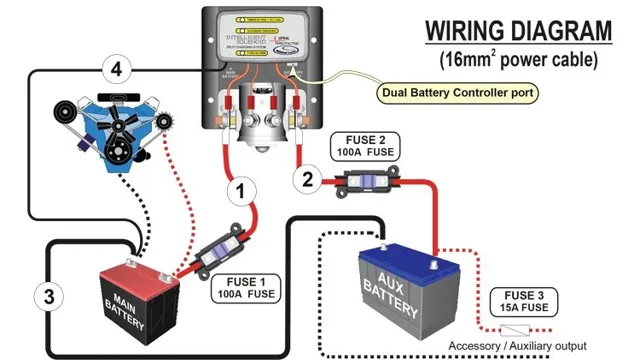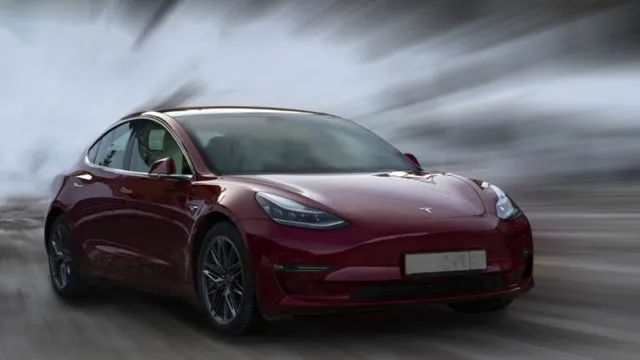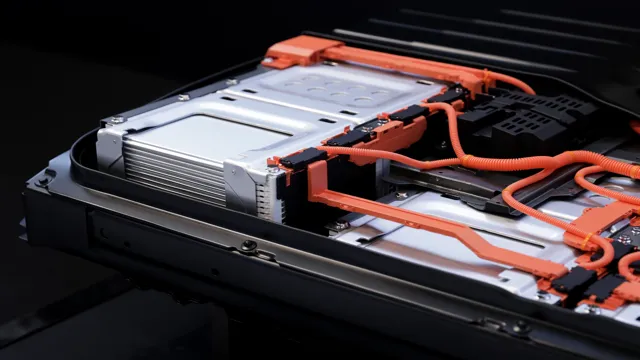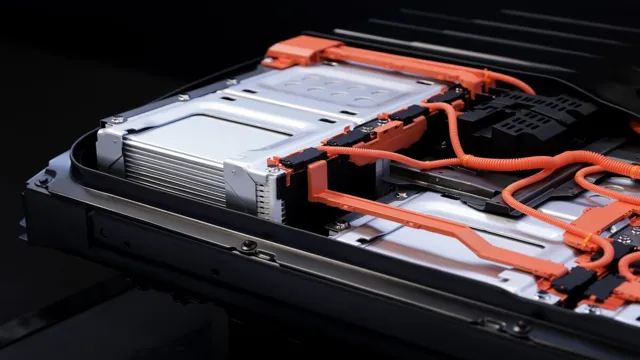Rev Up Your Range: The Ultimate Guide to Adding an Extra Battery to Your Electric Car
Are you an electric car owner looking for ways to extend your range and maximize your vehicle’s potential? Adding extra batteries to your electric car might be the perfect solution for you. By increasing your car’s battery capacity, you’ll be able to travel longer distances and reduce the frequency of charging. Driving an electric car is a great way to reduce your carbon footprint and save money on gas.
However, one of the biggest concerns for electric car owners is range anxiety. The fear of running out of battery and being stranded on the side of the road can be a significant deterrent for people considering buying an electric car. That’s where the option of adding extra batteries comes in.
Just like you might upgrade the battery on your phone or laptop, you can also upgrade the battery on your electric car. Whether you want to add an extra battery pack to your trunk or replace your existing battery with a higher-capacity one, there are several ways to increase your car’s battery range. By adding extra battery capacity to your electric car, you’ll be able to travel farther without worrying about running out of battery.
This is especially beneficial if you frequently drive long distances or use your electric car for commuting. Plus, with the growing popularity of electric cars, adding extra batteries can increase the resale value of your vehicle. Incorporating extra batteries into your electric car might sound daunting, but with the help of a professional mechanic, the process can be relatively straightforward.
You’ll have the peace of mind that comes with knowing your electric car can handle whatever journey you have planned. So why not explore this option and unlock your car’s full potential?
Why Add an Extra Battery?
Adding an extra battery to your electric car can be an excellent way to extend your driving range and eliminate the need to frequently stop and recharge. It can save you time and enable you to travel longer without worrying about running out of juice. With an additional battery, you can enjoy seamless driving experiences without experiencing range anxiety.
Moreover, having an extra battery doubles up the power supply, allowing your vehicle to perform better and provide more torque on the road. You’ll also be reducing your carbon footprint by making your electric car more efficient, which is essential in today’s environmentally conscious society. All in all, the benefits of adding an extra battery to your electric car are numerous, making it an investment worth considering!
Improved Range and Performance
Adding an extra battery to your electric scooter or bike can greatly improve its range and performance. One of the biggest concerns for electric vehicle owners is the limited range of their vehicles. By adding an extra battery to your electric scooter or bike, you can double or even triple its range, allowing you to travel farther and enjoy longer rides without the need for frequent recharging.
Not only does an extra battery extend your vehicle’s range, but it can also improve its overall performance, providing more power and faster acceleration. It’s like having an extra tank of gas for your vehicle, allowing you to go further and faster without any inconvenience. So, if you want to get the most out of your electric scooter or bike, consider adding an extra battery and experience the freedom of enhanced range and performance.
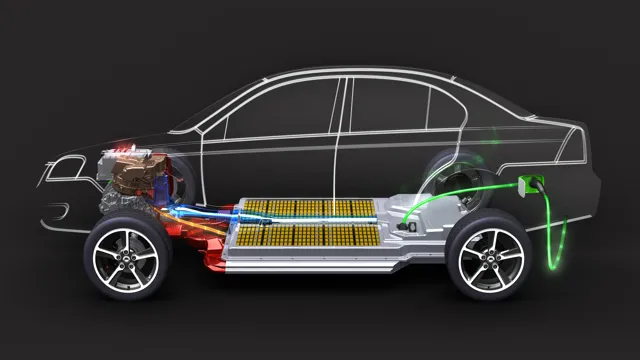
Reduced Charging Time
Adding an extra battery can drastically reduce your charging time and provide you with more convenience and peace of mind. With an extra battery, you can extend the life of your devices and have them prepared for any situation, whether you’re out and about or in an emergency. By having two separate batteries, you can make sure that one is always charged and ready to use while the other is charging, eliminating the need to wait for your device to power up.
This means you can spend less time tethered to an outlet and more time enjoying your favorite activities. Plus, with the peace of mind that comes with having a backup battery, you won’t have to worry about running out of power when you need it most. So, why not consider adding an extra battery to your device arsenal? It may just save you time, frustration, and stress in the long run.
Types of Extra Batteries Available
If you’re looking to add an extra battery to your electric car, there are several types of batteries available to suit your needs. The most common type is a lithium-ion battery, which is lightweight and has a high energy density. This allows it to provide more power and last longer than traditional lead-acid batteries.
Another option is a nickel-metal hydride battery, which is more environmentally friendly but not as powerful as lithium-ion. For those who want even more range, a plug-in hybrid electric vehicle (PHEV) allows you to add an additional battery pack that can be charged using a regular outlet. Alternatively, some car manufacturers offer extended-range electric vehicles (EREVs), which have a gasoline engine that acts as a backup generator to recharge the battery.
Ultimately, the type of battery you choose will depend on your driving needs, budget, and environmental priorities. Adding an extra battery to your electric car can be a great way to increase your range and reduce your carbon footprint, so be sure to do your research and choose the right battery for you.
Lithium-Ion Batteries
Lithium-ion batteries are a popular power source for electronic devices, and they come in various sizes and shapes to meet different needs. If you are looking for an extra battery, you might be wondering what options are available. One type is a standard replacement battery that is designed to fit your device’s specified requirements.
Another option is an extended battery that offers additional runtime beyond the standard battery. These can be bulkier than the standard battery, but they can be useful if you need your device to last longer between charges. You can also opt for a portable battery pack that can charge multiple devices simultaneously and be recharged on the go.
These can be convenient if you are travelling or spending time away from an electrical outlet. Whatever your needs, there is likely an extra battery option that can keep your device powered up and ready to go.
Lead-Acid Batteries
Lead-acid batteries are a popular choice for vehicles such as cars and boats. When it comes to extra batteries, there are two main types of lead-acid batteries: deep cycle and starting batteries. Starting batteries are designed to provide a quick burst of energy to start an engine, while deep cycle batteries are constructed to provide a lower amount of energy over an extended period of time.
Deep cycle batteries are often used in RVs, boats, and solar power systems, as they can discharge up to 80% of their total capacity without damage. Meanwhile, starting batteries are generally used in automobiles and only discharge up to 20% of their capacity. It’s important to choose the right type of lead-acid battery for your specific needs to ensure optimal performance and longevity.
Other Types of Batteries
When it comes to batteries, there are so many different types available that it can be overwhelming to decide which one is right for you. In addition to the common alkaline batteries, there are also rechargeable batteries, lithium batteries, and nickel-metal hydride batteries. Rechargeable batteries are a great option for those who use a lot of batteries, as they can be charged and used again and again, reducing waste.
Lithium batteries are known for their long lifespan and high energy density, making them ideal for use in electronics and other high-drain devices. Nickel-metal hydride batteries are another great option for rechargeable batteries, as they have a high capacity and can be recharged multiple times. Ultimately, the type of battery you choose will depend on your specific needs and usage habits.
Consider factors such as lifespan, energy density, and cost when making your decision.
Factors to Consider When Choosing an Extra Battery
If you are thinking about adding an extra battery to your electric car, there are several factors that you should consider. Firstly, you need to ensure that the extra battery is compatible with the make and model of your vehicle. This is important because not all electric cars have the same battery requirements.
Secondly, you need to think about the size and weight of the battery. You don’t want to add too much weight to your car, as this can impact its performance and handling. Additionally, you need to consider the range that the extra battery will give you.
Is the additional range worth the cost and inconvenience of carrying around a heavy battery? Lastly, you need to think about the charging time and how easy it is to charge the extra battery. Ideally, you want a battery that can charge quickly and easily, without requiring any specialized equipment. By considering all of these factors, you can ensure that you choose the right extra battery for your electric car, and enjoy all the benefits that it has to offer.
Capacity
When it comes to choosing an extra battery for your device, the capacity should be a top factor to consider. Capacity is the amount of power that a battery can hold and release, and it is usually measured in mAh (milliampere hour). A higher capacity means a longer battery life, which is important if you use your device heavily or need it for long periods of time.
However, a battery with a higher capacity may also be heavier and bulkier, which could affect portability. Moreover, a battery with a higher capacity might take longer to recharge fully. Therefore, when choosing an extra battery, it is important to strike a balance between capacity and other factors such as portability and charging time.
Compatibility with Car Model
When it comes to choosing an extra battery for your car, one of the most important factors to consider is its compatibility with your car model. Not all batteries are created equal, and not all of them will work with every type of car. That’s why it’s essential to do your research and ensure that you’re choosing a battery that is compatible with your vehicle’s make and model.
You don’t want to end up with a battery that’s too big or too small for your car’s electrical system, as this can cause problems with charging and even lead to damage to your car’s electronics. By checking the specifications and requirements of your car’s battery, you can make an informed decision on which extra battery to choose, ensuring that it will work seamlessly with your car and provide the additional power you need for your accessories or extended use.
Installation Requirements
When choosing an extra battery for your device, there are several factors to consider. The first thing to think about is the battery’s capacity – how long will it last on a single charge? You’ll also want to consider the size and weight of the battery, as well as its compatibility with your device. Some batteries are designed specifically for certain models, while others are more universal.
It’s important to ensure that you choose a battery that is both reliable and safe, so check out reviews from other users before making a purchase. Additionally, consider the charging time and whether the battery comes with any additional features, such as a built-in flashlight or wireless charging capabilities. By taking all of these factors into consideration, you can select the best extra battery for your specific needs and enjoy extended device use without worrying about unexpected shutdowns.
Conclusion
Adding an extra battery to an electric car is like giving it a double shot of espresso – it brings new energy to the ride and extends its endurance. It’s like the ultimate power-up, allowing you to rack up the miles and overcome any range anxiety. So why settle for mediocrity when you can supercharge your ride and take on the road with confidence? With an extra battery, you’ll be the envy of every other electric car on the block.
Don’t just drive, electrify!”
FAQs
Why should I consider adding an extra battery to my electric car?
Adding an extra battery to your electric car can significantly increase its range and reduce the need for frequent charging. This is especially useful for those who frequently travel long distances or use their electric car for daily commutes.
Can I install an extra battery myself, or do I need to take it to a professional mechanic?
It is recommended that you take your electric car to a professional mechanic who is experienced with electric car systems. Installing an extra battery requires specialized knowledge and tools, and can be dangerous if not done properly.
How much does it cost to add an extra battery to an electric car?
The cost of adding an extra battery to an electric car varies depending on the make and model of your car, as well as the type and size of battery you choose. It is recommended that you consult with a professional mechanic or electric car specialist to get an accurate estimate.
How will adding an extra battery affect the warranty on my electric car?
Adding an extra battery to your electric car could potentially void the warranty on your car’s electrical system. It is important to consult with your car manufacturer or dealer before making any modifications to your electric car, to ensure that you are not voiding your warranty.

